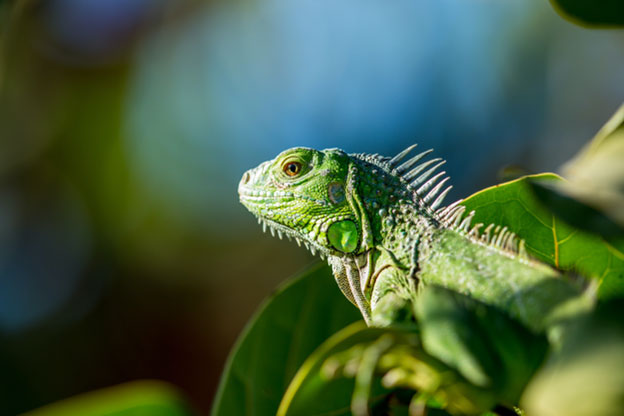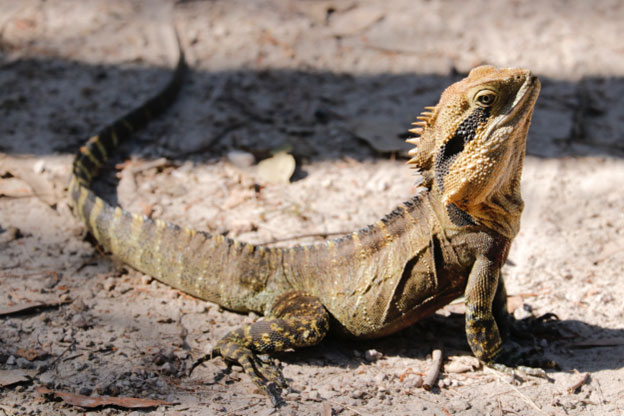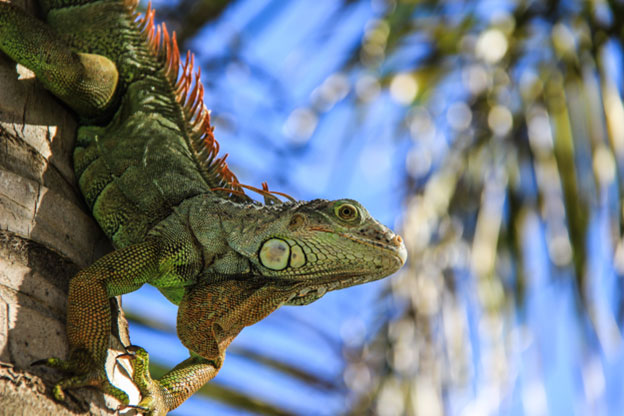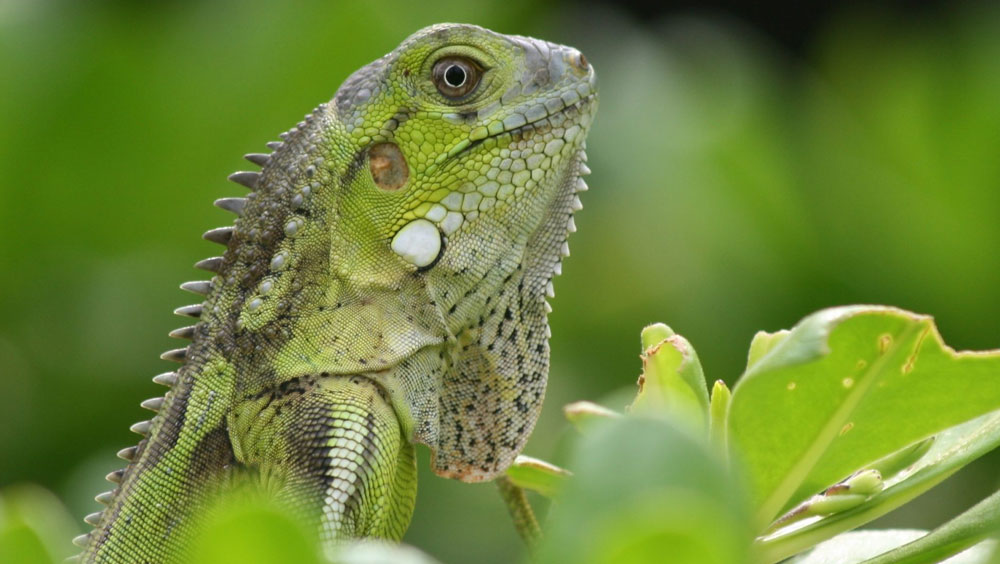Iguanas are a unique species of lizard that is becoming increasingly popular as pets. Many people are drawn to these reptiles because of their beautiful colors, interesting behaviors, and petite sizes. But do iguanas bite? Let's find out!

Understanding Iguana Behavior
In their natural habitat, iguanas exhibit a range of behaviors that are influenced by factors like age, health, and stress. These omnivorous species are known for their territorial aggression during the mating season, especially among males. Loud noises or sudden movements can also trigger their defense mechanisms.
Body language plays a vital role in understanding iguana behavior. When feeling threatened, they may raise their heads and inflate their dewlaps, the loose skin under their necks. Additionally, their tail acts as a powerful weapon that can be used for defense when cornered.
Reasons Why Iguanas May Bite
There are several potential reasons why iguanas may display aggressive behavior and possibly bite. One common cause is their territorial instincts. During the mating season, male iguanas in particular can become highly aggressive in defending their territory. This aggression is driven by their natural instincts to protect their breeding grounds and potential mates.
Furthermore, iguanas may feel threatened in certain situations, which can trigger aggressive behavior. Loud noises or sudden movements can startle these reptiles and provoke a defensive response. It is important to approach and interact with iguanas cautiously to avoid causing them distress.
Mistreatment or mishandling by humans can also lead to aggressive behavior in iguanas. If they have been subjected to rough handling or mistreatment in the past, they may associate humans with negative experiences, causing them to act defensively or even use their iguana teeth as a form of self-defense.
Signs of Aggression in Iguanas
One way to determine an iguana's mood is through their body language. When an iguana feels threatened, it may hiss as a warning sign. This hissing sound is typically accompanied by other aggressive body language cues, such as a puffed-up or inflated dewlap, which is a flap of loose skin on the iguana's throat. Another sign of potential aggression is tail whipping, where the spiny-tailed iguanas swing their tails from side to side.
Reducing the Risk of Bites
To reduce the risk of iguana bites and promote safe interactions, it's essential to establish trust and respect with these reptiles. Here are some practical tips:

Approach with caution: When encountering an iguana, move slowly and avoid sudden movements or loud noises that may startle them. Give them time to observe you from a safe distance and become comfortable with your presence.
Respect their personal space: Iguanas are territorial by nature, so it's important to maintain a respectful distance. Avoid crowding or cornering them, as this can trigger defensive behavior.
Handle gently and confidently: If you need to handle an iguana, do so calmly and confidently. Support their body with both hands, keeping their weight well-distributed and allowing them to feel secure. Avoid restraining or squeezing them, as this can cause stress and increase the likelihood of a bite.
Avoid vulnerable areas: Be mindful of the iguana's sharp teeth and powerful tail. Refrain from touching or grabbing their head, tail, or limbs, as these areas may elicit defensive reactions.
Establish positive associations: Offer your iguana treats, such as their favorite fruits or vegetables, to associate your presence with positive experiences. Gradually build trust over time by consistently providing food, maintaining a comfortable environment, and engaging in gentle interactions.
Proper Iguana Handling Techniques
Properly handling an iguana is crucial for both their well-being and your safety. Follow these step-by-step techniques to handle an iguana safely:
Use both hands: With one hand, gently grasp the base of the iguana's tail, supporting its weight. With your other hand, support the midsection of its body.
Lift gently: Lift the iguana slowly and smoothly, supporting its body weight evenly with both hands. Avoid squeezing or restricting its movements.
Keep a secure grip: Maintain a firm but gentle grip on the iguana to prevent accidents or sudden movements. Keep its body close to your body to provide a sense of security.
Release carefully: When it's time to release the iguana, find a safe and appropriate location. Slowly and gently lower it back down, allowing it to regain its balance and move away on its own accord.
Tips for Interacting with Wild Iguanas
When encountering wild iguanas during outdoor activities, it is important to remember that they are wild animals and should be observed from a respectful distance. It is not recommended to attempt to touch or feed them, as this can cause stress and potentially dangerous situations for both humans and the iguanas.
Caring for Captive Iguanas
Keeping an iguana as a pet comes with great responsibility. These fascinating creatures require specific care to ensure their health and well-being.
One of the most crucial aspects of caring for a captive iguana is providing a suitable environment. Iguanas need a large enclosure that mimics their natural habitat. This includes a spacious enclosure with plenty of climbing opportunities, basking areas, and hiding spots. Temperature and humidity levels should be monitored and maintained within the recommended range.

Proper nutrition is also essential for captive iguanas. Their diet should consist of a variety of leafy greens, vegetables, and occasional fruits. Calcium and vitamin supplements are often recommended to prevent nutritional deficiencies.
Regular vet check-ups are another important responsibility of iguana owners. A veterinarian experienced in reptile care can monitor the iguana's health, provide necessary vaccinations, and perform check-ups to ensure their well-being.
Lastly, it is crucial to be knowledgeable about common health issues that captive iguanas may experience. This includes metabolic bone disease, respiratory infections, and parasites. Prompt veterinary attention should be sought if any signs of illness or abnormal behavior are observed.
Conclusion
In conclusion, it is important to understand and respect the behavior and biting tendencies of iguanas. While they may not be naturally social animals, they still require proper care and environmental enrichment to ensure their well-being. Interactions with iguanas should be kept to a minimum to avoid stress and territorial aggression.
When handling or caring for an iguana, it is crucial to be mindful of its body language and signs of discomfort. Avoid loud noises and sudden movements that can startle them into biting. In the wild, iguanas use their sharp teeth and powerful tail for defense, and an iguana bite can result in pain and potential bacterial infections.
Frequently Asked Questions
Are all iguanas aggressive and likely to bite?
No, not all iguanas are aggressive and likely to bite. However, iguanas tend to become aggressive if they feel threatened or stressed. It is important to understand their body language and signs of discomfort to avoid potential bites.
How do I know if an iguana is feeling threatened?
Iguanas display certain body language cues when they feel threatened. These can include hissing, puffing up their body, bobbing their head, or lashing their tail. If you notice these behaviors, it is best to back away and give the iguana space.

Can iguanas be tamed and become friendly pets?
Yes, iguanas can be tamed and become friendly pets with proper care and socialization. It is important to establish a bond with your pet iguana through regular handling and positive reinforcement. However, it is crucial to remember that they are still wild animals with certain instincts and behaviors.
What should I do if I get bitten by an iguana?
If you are bitten by an iguana, make sure to clean the wound thoroughly with warm soapy water to reduce the risk of bacterial infection. Seek medical treatment if the bite is severe or shows signs of infection, such as redness, swelling, or discharge.
Are iguanas legal to keep as pets in all locations?
Iguana ownership regulations vary depending on your location. In some areas, it may be legal to keep iguanas as pets, while in others they may be considered invasive species or require specific permits. It is important to research and comply with the local laws and regulations regarding iguana ownership.


